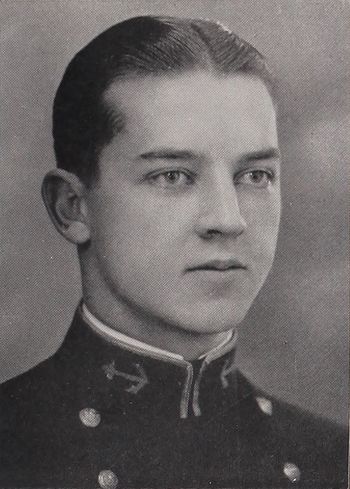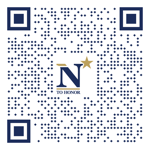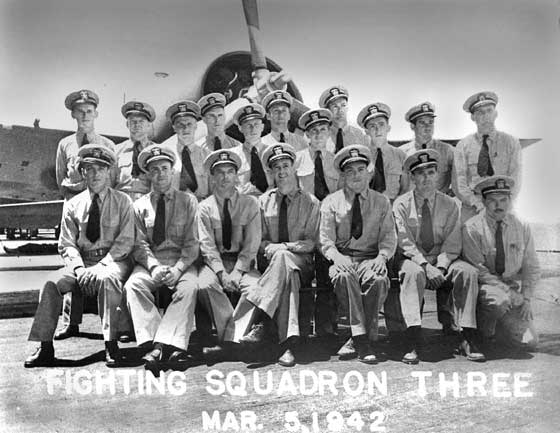DONALD A. LOVELACE, LCDR, USN
Donald Lovelace '28
Lucky Bag
From the 1928 Lucky Bag:
DONALD ALEXANDER LOVELACE
Scottsburg, Virginia
"Don" "Lovey"
SCOTTSBURG, Virginia, has the proud honor of being the birthplace of our Lovey. After various transfers his hometown became Farmville, North Carolina. Here Donald played in the huge tobacco warehouses, stole an occasional snipe in some dark shadow, and in his spare moments passed from the second year through the Farmville High School. Don received an appointment as first alternate for the Naval Academy, and for no good reason found himself principal with his certificate accepted.
At the Academy Lovey developed the remarkable faculty of keeping his academic abilities hidden until the finals, and then putting out the knockout punch. His time with the all-Academics did not keep him from doing his bit in athletics, for he held his own in class basketball, class baseball, and class football. He tried his hand at class boxing and had plenty of time to think over his first bout while in sick bay. He received his reward in the frequent—"Mr. Lovelace, how is that nose? Well, you have learned the first lesson in boxing: how to take punishment."
Don uses that school-girl complexion to advantage and has his string of admirers. He is a good sport, a true friend—and in short a Southern Gentleman.
Football (1), Class (3, 2); Class Baseball (3, 2); Class Boxing (3); Class Basketball (3, 2); Reception Committee (3, 2, 1).

DONALD ALEXANDER LOVELACE
Scottsburg, Virginia
"Don" "Lovey"
SCOTTSBURG, Virginia, has the proud honor of being the birthplace of our Lovey. After various transfers his hometown became Farmville, North Carolina. Here Donald played in the huge tobacco warehouses, stole an occasional snipe in some dark shadow, and in his spare moments passed from the second year through the Farmville High School. Don received an appointment as first alternate for the Naval Academy, and for no good reason found himself principal with his certificate accepted.
At the Academy Lovey developed the remarkable faculty of keeping his academic abilities hidden until the finals, and then putting out the knockout punch. His time with the all-Academics did not keep him from doing his bit in athletics, for he held his own in class basketball, class baseball, and class football. He tried his hand at class boxing and had plenty of time to think over his first bout while in sick bay. He received his reward in the frequent—"Mr. Lovelace, how is that nose? Well, you have learned the first lesson in boxing: how to take punishment."
Don uses that school-girl complexion to advantage and has his string of admirers. He is a good sport, a true friend—and in short a Southern Gentleman.
Football (1), Class (3, 2); Class Baseball (3, 2); Class Boxing (3); Class Basketball (3, 2); Reception Committee (3, 2, 1).
Loss
Don was lost on May 30, 1942, when one of his squadron-mates crashed their F4F-4 Hellcat into Don's on the deck of USS Yorktown (CV 5).
He was the executive officer of Fighting Squadron (VF) 3.
Other Information
From researcher Kathy Franz:
Donald married Helen Louise Rooney on November 22, 1928, at her home in Charleston, South Carolina. Their daughter was Sally, and their son was Donald, Jr.
Per The News and Observer, Raleigh, North Carolina, March 9, 1935: Donald was commended by his admiral to the commander of the fleet for the skillful handling of his plane when motor trouble arose. This happened during the return flight of 24 planes from Kingston, Jamaica, to Panama. He made a forced landing necessary on a very rough sea and displayed unusual presence of mind and skill in saving the plane and his passengers.
His father Jerry White was a tobacco buyer for A. C. Monk Tobacco Co., his mother was Sallie Lillian and brother was James.
His wife was listed as next of kin. He has a memory marker in Virginia.
Remembrances
From The First Team: Pacific Naval Air Combat from Pearl Harbor to Midway:
Executive officer of Fighting Three was Lieut. Donald A. Lovelace. Younger than [commanding officer John] Thach by one year and a member of the Naval Academy's Class of 1928, Lovelace likewise possessed a wide variety of naval aviation experience. Earning his wings in 1931, he spent three years in Utility Squadron Two (VJ-2S) aboard the seaplane tender Wright, then flew Douglas P2D-1 twin-float torpedo planes with Patrol Three (VP-3F) based at NAS Coco Solo. His first carrier duty came in the summer of 1936 when he joined Scouting One (VS-1B) on board the Ranger (CV-4). Still aboard the Ranger, Scouting One in July 1937 became Scouting Forty-one (VS-41), and Lovelace worked his way up to flight officer. Shore duty in 1939-40 at the Naval Aircraft Factory intervened; then on 6 January 1941 he became executive officer of Fighting Three. In Don Lovelace the squadron discovered a quiet, conscientious, and thoughtful leader who fitted in well with the skipper's way of running the outfit. Thach and he became close friends.
Later in the book:
Don Lovelace reported in for temporary duty with Fighting Three, carrying in his pocket the permanent orders he had so long wanted—command of a fighting squadron. While stateside he had succeeded in changing his orders from commander of Scouting Ten to commander of Fighting Two. … Reporting in, Lovelace learned that Thach was heading out shortly with a mixed bag of pilots. His own VF-2 could not assemble as a unit for several weeks; so Lovelace volunteered his services in his old spot as executive officer of Fighting Three.
Photographs
The pilots of the U.S. Navy Fighting Squadron 3 (VF-3) in front of a Grumman F4F-3 Wildcat fighter, 5 March 1942. Standing (l-r): Newton H. Mason, Howard F. Clark, Edward R. Sellstrom, Willard E. Eder, Howard L. Johnson, John H. Lackey, Leon W. Haynes, Onia B. Stanley, Jr., Dale W. Peterson, Marion Dufilho, Rolla S. Lemmon. Sitting (l-r): Robert J. Morgan, Albert O. Vorse, Jr., Donald A. Lovelace, John S. “Jimmy” Thach, Noel A.M. Gayler, Edward H. “Butch” O’Hare, Richard M. Rowell.
Distinguished Flying Cross
From Hall of Valor:
The President of the United States of America takes pride in presenting the Distinguished Flying Cross (Posthumously) to Lieutenant Commander Donald Alexander Lovelace (NSN: 0-62074), United States Navy, for extraordinary heroism while participating in aerial flight, while serving as Pilot of an airplane in an Fighting Squadron TWO (VF-2), attached to the U.S.S. LEXINGTON (CV-2), in action against enemy forces in the Pacific War Area when his carrier was attacked by Japanese bombing planes on 20 February 1942. Lieutenant Commander Lovelace led his division in a vigorous and determined attack in the face of combined machine gun and cannon fire, against a formation of enemy bombers, and he, with the assistance of his teammate caused the destruction of one enemy bomber.
Service: Navy Rank: Lieutenant Commander
Battalion: Fighting Squadron 2 (VF-2)
Division: U.S.S. Lexington (CV-2)
Namesake
USS Lovelace (DE 198) was named for Donald; the ship was sponsored by his widow.
Related Articles
Edward O'Hare '37, Howard Clark '38, Richard Crommelin '38, and Marion Dufilho '38 were also members of Fighting Squadron (VF) 3 in early 1942.
The "Register of Commissioned and Warrant Officers of the United States Navy and Marine Corps" was published annually from 1815 through at least the 1970s; it provided rank, command or station, and occasionally billet until the beginning of World War II when command/station was no longer included. Scanned copies were reviewed and data entered from the mid-1840s through 1922, when more-frequent Navy Directories were available.
The Navy Directory was a publication that provided information on the command, billet, and rank of every active and retired naval officer. Single editions have been found online from January 1915 and March 1918, and then from three to six editions per year from 1923 through 1940; the final edition is from April 1941.
The entries in both series of documents are sometimes cryptic and confusing. They are often inconsistent, even within an edition, with the name of commands; this is especially true for aviation squadrons in the 1920s and early 1930s.
Alumni listed at the same command may or may not have had significant interactions; they could have shared a stateroom or workspace, stood many hours of watch together, or, especially at the larger commands, they might not have known each other at all. The information provides the opportunity to draw connections that are otherwise invisible, though, and gives a fuller view of the professional experiences of these alumni in Memorial Hall.
October 1928
July 1929
October 1929
January 1930
April 1930
LT James Carney '21
LT John Jones '21
LTjg William Davis '22
LT James Craig '22
LTjg Matthias Marple, Jr. '23
LTjg Theodore Marshall '24
LTjg Walter Dey '24
LTjg James McDonough '24
LTjg John Waldron '24
October 1930
LT Paul Thompson '19
LT Irving Wiltsie '21
LTjg Matthias Marple, Jr. '23
LTjg Robert Larson '24
LTjg James McDonough '24
LTjg John Waldron '24
LTjg Charles McDonald '24
LTjg Richard Moss '24
January 1931
LT Paul Thompson '19
LT Irving Wiltsie '21
LTjg Matthias Marple, Jr. '23
LTjg Robert Larson '24
LTjg James McDonough '24
LTjg John Waldron '24
LTjg Charles McDonald '24
LTjg Richard Moss '24
LTjg John Duke '26
April 1931
July 1931
October 1931
January 1932
April 1932
October 1932
January 1933
April 1933
July 1933
October 1933
April 1934
July 1934
October 1934
January 1935
April 1935
October 1935
January 1936
April 1936
July 1936
LTjg Ralph Smith '26 (Bombing Plane Squadron (VB) 1B)
LTjg Seymour Johnson '27 (Fighting Plane Squadron (VF) 3B)
LTjg James McRoberts '27 (Fighting Plane Squadron (VF) 3B)
LTjg Lorenz Forbes '31 (Bombing Plane Squadron (VB) 3B)
LTjg Leo Crane '31 (Fighting Plane Squadron (VF) 5B)
LTjg Alfred Tucker, III '31 (Bombing Plane Squadron (VB) 1B)
LTjg Robert Strickler '32 (Fighting Plane Squadron (VF) 5B)
LTjg William Widhelm '32 (Fighting Plane Squadron (VF) 5B)
ENS Earle Schneider '33 (USS Ranger)
ENS Milton Ricketts '35 (USS Ranger)
ENS John Daub, Jr. '36 (USS Ranger)
January 1937
LT Ralph Smith '26 (Bombing Plane Squadron (VB) 1B)
LT Seymour Johnson '27 (Fighting Plane Squadron (VF) 3B)
LTjg Lorenz Forbes '31 (Bombing Plane Squadron (VB) 3B)
LTjg Leo Crane '31 (Fighting Plane Squadron (VF) 5B)
LTjg Alfred Tucker, III '31 (Bombing Plane Squadron (VB) 1B)
LTjg Robert Strickler '32 (Fighting Plane Squadron (VF) 5B)
LTjg William Widhelm '32 (Fighting Plane Squadron (VF) 5B)
LTjg Earle Schneider '33 (USS Ranger)
ENS Milton Ricketts '35 (USS Ranger)
ENS John Daub, Jr. '36 (USS Ranger)
April 1937
LT Ralph Smith '26 (Bombing Plane Squadron (VB) 1B)
LT Seymour Johnson '27 (Fighting Plane Squadron (VF) 3B)
LTjg Leo Crane '31 (Fighting Plane Squadron (VF) 5B)
LTjg Albert Gray '31 (Bombing Plane Squadron (VB) 1B)
LTjg Robert Strickler '32 (Fighting Plane Squadron (VF) 5B)
LTjg William Widhelm '32 (Fighting Plane Squadron (VF) 5B)
LTjg Earle Schneider '33 (USS Ranger)
ENS William Hulson '36 (USS Ranger)
ENS John Daub, Jr. '36 (USS Ranger)
September 1937
LTjg George Hutchinson '32 (Bombing Squadron (VB) 4)
LTjg Robert Strickler '32 (Fighting Squadron (VF) 4)
LTjg William Townsend '32 (Fighting Squadron (VF) 4)
LTjg Charles Brewer '34 (Fighting Squadron (VF) 4)
ENS William Hulson '36 (USS Ranger)
ENS John Daub, Jr. '36 (USS Ranger)
January 1938
LTjg Robert Strickler '32 (Fighting Squadron (VF) 4)
LTjg William Townsend '32 (Fighting Squadron (VF) 4)
LTjg Frank Fernald '33 (Fighting Squadron (VF) 4)
ENS William Hulson '36 (USS Ranger)
ENS John Daub, Jr. '36 (USS Ranger)
July 1938
LT William Pennewill '29 (Scouting Squadron (VS) 42)
LTjg Harrington Drake '31 (Bombing Squadron (VB) 4)
LTjg William Townsend '32 (Fighting Squadron (VF) 4)
LTjg Frederick Schrader '35 (Fighting Squadron (VF) 4)
ENS Harry Howell '38 (USS Ranger)
ENS Walter Sharer '38 (USS Ranger)
ENS Floyd Garrett, Jr. '38 (USS Ranger)
ENS Richard Sampson '38 (USS Ranger)
January 1939
LT William Pennewill '29 (Scouting Squadron (VS) 42)
LTjg Harrington Drake '31 (Bombing Squadron (VB) 4)
LTjg William Townsend '32 (Fighting Squadron (VF) 4)
LTjg Frederick Schrader '35 (Fighting Squadron (VF) 4)
ENS Harry Howell '38 (USS Ranger)
ENS Walter Sharer '38 (USS Ranger)
ENS Floyd Garrett, Jr. '38 (USS Ranger)
ENS Richard Sampson '38 (USS Ranger)
October 1939
2LT John Maclaughlin, Jr. '38 (Marine Barracks)
2LT Ralph Mann, Jr. '39 (Marine Corps Schools, Marine Barracks)
2LT William Pace '39 (Marine Corps Schools, Marine Barracks)
2LT Willard Holdredge '39 (Marine Corps Schools, Marine Barracks)
2LT William Hogaboom '39 (Marine Corps Schools, Marine Barracks)
2LT John Fantone '39 (Marine Corps Schools, Marine Barracks)
2LT Hugh Tistadt, Jr. '39 (Marine Corps Schools, Marine Barracks)
2LT William Harris '39 (Marine Corps Schools, Marine Barracks)
2LT Alfred Gordon '39 (Marine Corps Schools, Marine Barracks)
June 1940
November 1940
April 1941
LT Weldon Hamilton '28 (Bombing Squadron (VB) 2)
LT Clair Miller '29 (Torpedo Squadron (VT) 2)
LT Charles Crommelin '31 (Fighting Squadron (VF) 2)
LTjg Robert Fair '33 (USS Lexington)
LTjg Joel Davis, Jr. '35 (Bombing Squadron (VB) 2)
LTjg Raymond Moore '37 (Torpedo Squadron (VT) 2)
ENS Harry Bass '38 (Bombing Squadron (VB) 2)
ENS Edward Price '39 (USS Lexington)
ENS Allan Wussow '39 (USS Lexington)
ENS Edward Seiler, Jr. '39 (USS Lexington)
ENS Willard Sampson '40 (USS Lexington)
Memorial Hall Error
Don is listed on the killed in action panel at the front of Memorial Hall, but his loss was an operational one.

The "category" links below lead to lists of related Honorees; use them to explore further the service and sacrifice of alumni in Memorial Hall.
